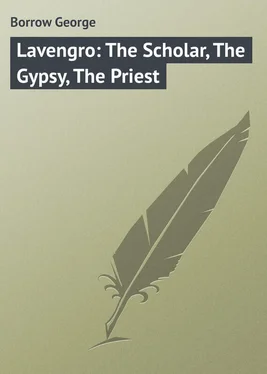George Borrow - Lavengro - The Scholar, The Gypsy, The Priest
Здесь есть возможность читать онлайн «George Borrow - Lavengro - The Scholar, The Gypsy, The Priest» — ознакомительный отрывок электронной книги совершенно бесплатно, а после прочтения отрывка купить полную версию. В некоторых случаях можно слушать аудио, скачать через торрент в формате fb2 и присутствует краткое содержание. Жанр: foreign_prose, на английском языке. Описание произведения, (предисловие) а так же отзывы посетителей доступны на портале библиотеки ЛибКат.
- Название:Lavengro: The Scholar, The Gypsy, The Priest
- Автор:
- Жанр:
- Год:неизвестен
- ISBN:нет данных
- Рейтинг книги:5 / 5. Голосов: 1
-
Избранное:Добавить в избранное
- Отзывы:
-
Ваша оценка:
- 100
- 1
- 2
- 3
- 4
- 5
Lavengro: The Scholar, The Gypsy, The Priest: краткое содержание, описание и аннотация
Предлагаем к чтению аннотацию, описание, краткое содержание или предисловие (зависит от того, что написал сам автор книги «Lavengro: The Scholar, The Gypsy, The Priest»). Если вы не нашли необходимую информацию о книге — напишите в комментариях, мы постараемся отыскать её.
Lavengro: The Scholar, The Gypsy, The Priest — читать онлайн ознакомительный отрывок
Ниже представлен текст книги, разбитый по страницам. Система сохранения места последней прочитанной страницы, позволяет с удобством читать онлайн бесплатно книгу «Lavengro: The Scholar, The Gypsy, The Priest», без необходимости каждый раз заново искать на чём Вы остановились. Поставьте закладку, и сможете в любой момент перейти на страницу, на которой закончили чтение.
Интервал:
Закладка:
I still seem to see it, the huge grim thing; many of the others were large, strikingly so, and appeared fully to justify the old man’s conclusion that their owners must have been strange fellows; but, compared with this mighty mass of bone, they looked small and diminutive like those of pigmies; it must have belonged to a giant, one of those red-haired warriors of whose strength and stature such wondrous tales are told in the ancient chronicles of the north, and whose grave-hills, when ransacked, occasionally reveal secrets which fill the minds of puny moderns with astonishment and awe. Reader, have you ever pored days and nights over the pages of Snorro? – probably not, for he wrote in a language which few of the present day understand, and few would be tempted to read him tamed down by Latin dragomans. A brave old book is that of Snorro, containing the histories and adventures of old northern kings and champions, who seemed to have been quite different men, if we may judge from the feats which they performed, from those of these days; one of the best of his histories is that which describes the life of Harald Haardraade, who, after manifold adventures by land and sea, now a pirate, now a mercenary of the Greek emperor, became king of Norway, and eventually perished at the battle of Stamford Bridge, whilst engaged in a gallant onslaught upon England. Now, I have often thought that the old Kemp, whose mouldering skull in the Golgotha of Hythe my brother and myself could scarcely lift, must have resembled in one respect at least this Harald, whom Snorro describes as a great and wise ruler and a determined leader, dangerous in battle, of fair presence and measuring in height 2 2 Norwegian ells – about eight feet.
just five ells , neither more nor less.
I never forgot the Daneman’s skull; like the apparition of the viper in the sandy lane, it dwelt in the mind of the boy, affording copious food for the exercise of imagination. From that moment with the name of Dane were associated strange ideas of strength, daring, and superhuman stature; and an undefinable curiosity for all that is connected with the Danish race began to pervade me; and if, long after, when I became a student I devoted myself with peculiar zest to Danish lore and the acquirement of the old Norse tongue and its dialects, I can only explain the matter by the early impression received at Hythe from the tale of the old sexton, beneath the pent-house, and the sight of the Danish skull.
And thus we went on straying from place to place, at Hythe to-day, and perhaps within a week looking out from our hostel-window upon the streets of old Winchester, our motions ever in accordance with the ‘route’ of the regiment, so habituated to change of scene that it had become almost necessary to our existence. Pleasant were these days of my early boyhood; and a melancholy pleasure steals over me as I recall them. Those were stirring times of which I am speaking, and there was much passing around me calculated to captivate the imagination. The dreadful struggle which so long convulsed Europe, and in which England bore so prominent a part, was then at its hottest; we were at war, and determination and enthusiasm shone in every face; man, woman, and child were eager to fight the Frank, the hereditary, but, thank God, never dreaded enemy of the Anglo-Saxon race. ‘Love your country and beat the French, and then never mind what happens,’ was the cry of entire England. Oh, those were days of power, gallant days, bustling days, worth the bravest days of chivalry at least; tall battalions of native warriors were marching through the land; there was the glitter of the bayonet and the gleam of the sabre; the shrill squeak of the fife and loud rattling of the drum were heard in the streets of country towns, and the loyal shouts of the inhabitants greeted the soldiery on their arrival, or cheered them at their departure. And now let us leave the upland, and descend to the sea-bord; there is a sight for you upon the billows! A dozen men-of-war are gliding majestically out of port, their long buntings streaming from the top-gallant masts, calling on the skulking Frenchman to come forth from his bights and bays; and what looms upon us yonder from the fog-bank in the east? a gallant frigate towing behind her the long low hull of a crippled privateer, which but three short days ago had left Dieppe to skim the sea, and whose crew of ferocious hearts are now cursing their imprudence in an English hold. Stirring times those, which I love to recall, for they were days of gallantry and enthusiasm, and were moreover the days of my boyhood.
CHAPTER THREE
PRETTY D-THE VENERABLE CHURCH – THE STRICKEN HEART – DORMANT ENERGIES – THE SMALL PACKET – NERVES – THE BOOKS – A PICTURE – MOUNTAIN-LIKE BILLOWS – THE FOOTPRINT – SPIRIT OF DE FOE – REASONING POWERS – TERRORS OF GOD – HEADS OF THE DRAGONS – HIGH-CHURCH CLERK – A JOURNEY – MY FATHER RECALLED TO HIS REGIMENT – THE DROWNED COUNTRY
And when I was between six and seven years of age we were once more at D-, the place of my birth, whither my father had been despatched on the recruiting service. I have already said that it was a beautiful little town – at least it was at the time of which I am speaking – what it is at present I know not, for thirty years and more have elapsed since I last trod its streets. It will scarcely have improved, for how could it be better than it then was? I love to think on thee, pretty quiet D-, thou pattern of an English country town, with thy clean but narrow streets branching out from thy modest market-place, with thine old-fashioned houses, with here and there a roof of venerable thatch, with thy one half-aristocratic mansion, where resided thy Lady Bountiful – she, the generous and kind, who loved to visit the sick, leaning on her gold-headed cane, whilst the sleek old footman walked at a respectful distance behind. Pretty quiet D-, with thy venerable church, in which moulder the mortal remains of England’s sweetest and most pious bard.
Yes, pretty D-, I could always love thee, were it but for the sake of him who sleeps beneath the marble slab in yonder quiet chancel. It was within thee that the long-oppressed bosom heaved its last sigh, and the crushed and gentle spirit escaped from a world in which it had known nought but sorrow. Sorrow! do I say? How faint a word to express the misery of that bruised reed; misery so dark that a blind worm like myself is occasionally tempted to exclaim, Better had the world never been created than that one so kind, so harmless, and so mild, should have undergone such intolerable woe! But it is over now, for, as there is an end of joy, so has affliction its termination. Doubtless the All-wise did not afflict him without a cause: who knows but within that unhappy frame lurked vicious seeds which the sunbeams of joy and prosperity might have called into life and vigour? Perhaps the withering blasts of misery nipped that which otherwise might have terminated in fruit noxious and lamentable. But peace to the unhappy one, he is gone to his rest; the death-like face is no longer occasionally seen timidly and mournfully looking for a moment through the window-pane upon thy market-place, quiet and pretty D-; the hind in thy neighbourhood no longer at evening-fall views, and starts as he views, the dark lathy figure moving beneath the hazels and alders of shadowy lanes, or by the side of murmuring trout streams, and no longer at early dawn does the sexton of the old church reverently doff his hat as, supported by some kind friend, the death-stricken creature totters along the church-path to that mouldering edifice with the low roof, enclosing a spring of sanatory waters, built and devoted to some saint, if the legend over the door be true, by the daughter of an East Anglian king.
Читать дальшеИнтервал:
Закладка:
Похожие книги на «Lavengro: The Scholar, The Gypsy, The Priest»
Представляем Вашему вниманию похожие книги на «Lavengro: The Scholar, The Gypsy, The Priest» списком для выбора. Мы отобрали схожую по названию и смыслу литературу в надежде предоставить читателям больше вариантов отыскать новые, интересные, ещё непрочитанные произведения.
Обсуждение, отзывы о книге «Lavengro: The Scholar, The Gypsy, The Priest» и просто собственные мнения читателей. Оставьте ваши комментарии, напишите, что Вы думаете о произведении, его смысле или главных героях. Укажите что конкретно понравилось, а что нет, и почему Вы так считаете.












